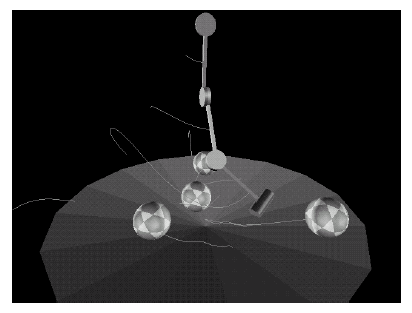Impulse-based Dynamic Simulation of Rigid Body Systems
Brian Vincent Mirtich
Ph.D. Thesis
University of California at Berkeley

download PDF: MirtichThesis.pdf (5.7 MB)
download gzipped Postscript: MirtichThesis.ps.gz (3.3 MB)
Abstract
Dynamic simulation is a powerful application of today's computers, with uses in fields ranging from engineering to animation to virtual reality. This thesis introduces a new paradigm for dynamic simulation, called impulsebased simulation. The paradigm is designed to meet the twin goals of physical accuracy and computational efficiency. Obtaining physically accurate results is often the whole reason for performing a simulation, however, in many applications, computational efficiency is equally important. Impulsebased simulation is designed to simulate moderately complex systems at interactive speeds. To achieve this performance, certain restrictions are made on the systems to be simulated. The strongest restriction is that they comprise only rigid bodies.
The hardest part of rigid body simulation is modeling the interactions that occur between bodies in contact. The most commonly used approaches are penalty methods, followed by analytic methods. Both of these approaches are constraintbased, meaning that constraint forces at the contact points are continually computed and applied to deter mine the accelerations of the bodies. Impulsebased simulation is a departure from these approaches, in that there are no explicit constraints to be maintained at contact points. Rather, all contact interactions between bodies are affected through collisions; rolling, sliding, resting, and colliding contact are all modeled in this way. The approach has several advantages, including simplicity, robustness, parallelizability, and an ability to efficiently simulate classes of systems that are difficult to simulate using constraintbased methods. The accuracy of impulsebased simulation has been experimentally tested and is sufficient for many applications.
NOTE:
Due to the number of requests for electronic copies of Brian's thesis, I am
currently hosting these files with Brian's permission. -James